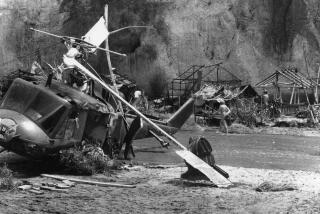Retaliation or Justice for the Plane Bombing?
- Share via
At the memorial service in Scotland for the victims of the Pan Am bombing, the preacher said, “Justice--yes; retaliation--no.” How are we to define the fine line that separates them?
Suppose it is proved that Semtex was used to destroy Flight No. 103. Suppose, too, it is established, beyond reasonable doubt, that agents of the Libyan, or any other government, supplied this explosive and paid, or otherwise motivated, the terrorists who placed it aboard. Would that government not be as guilty of murdering those 270 victims as were the men who stood trial at Nuremberg for murdering Jews in their Nazi gas chambers?
It is possible though not, I think, likely, that the U.S. and British police will identify, catch and convict in a court of law the individuals who planted the bomb. But is that to be the end of the matter? Suppose it is demonstrated, perhaps by the terrorists themselves, that they were no more than “tools” of the political managers of Libya, Syria or Iran, who financed, munitioned and gave the orders for this terrible act? Are these godfathers of terror to escape responsibility, simply because, without going to war, we cannot bring the Kadafis of this world before the international Court of Justice (which, in any case, doesn’t have power to deal with criminal acts)?
The preacher at Lockerbie erred. For justice must not discriminate between those who plant a bomb and those who deliberately instruct and inspire them to detonate it. Both are equally guilty. Both must fact the consequences if justice is to be done.
Like the preacher at Lockerbie, I should be opposed to U.S. “retaliation” against the Libyan or any other government, unless there is overwhelming evidence of its leaders’ complicity. But should that proof be forthcoming, retribution there must be.
How else is justice to be done on behalf of all the prospective victims of future acts of terror, commissioned by outlaw states?
SIR ELDON GRIFFITHS
Mission Viejo
Sir Eldon Griffiths is a visiting professor at UC Irvine, president of the World Affairs Council of Orange County and a member of the British House of Commons.
More to Read
Sign up for Essential California
The most important California stories and recommendations in your inbox every morning.
You may occasionally receive promotional content from the Los Angeles Times.










